Marjorie Taylor Greene is a highly controversial U.S. Congresswoman known for her fiery rhetoric, promoting conspiracy theories, and staunch Trump support. She’s faced backlash for spreading false election claims, endorsing QAnon, and making inflammatory statements. Her social media presence amplifies her polarizing impact, fueling division. Her bold style and divisive views make her a prominent figure in politics today. If you keep exploring, you’ll uncover more about her dynamic and often provocative role in Congress.
Key Takeaways
- Greene is known for promoting election fraud claims and supporting QAnon conspiracy theories.
- She uses provocative rhetoric and social media to spread divisive and controversial political messages.
- Greene has faced removal from key House committees due to her extremist views and inflammatory statements.
- She advocates for strict immigration policies, cultural conservatism, and America First policies.
- Her outspoken stance and controversial actions have made her a polarizing figure in U.S. politics.
Early Life and Business Background

Marjorie Taylor Greene was born on May 27, 1974, in Milledgeville, Georgia, into a family with a strong business background. Her father, Robert Taylor, moved from Michigan to Georgia and built a construction company that shaped her early years. Growing up in the northeastern suburbs of Atlanta, you can imagine her immersed in family business activities. She graduated from South Forsyth High School in 1992, then attended the University of Georgia, earning a Bachelor of Business Administration in 1996. During high school and college, she was actively involved in her family’s construction business, eventually serving as chief financial officer from 2007 to 2011. Her early exposure to entrepreneurship laid the foundation for her later ventures and career pursuits. Additionally, her background in business and management provided her with skills that would later influence her approach to politics and leadership.
Entry Into Politics and Congressional Rise
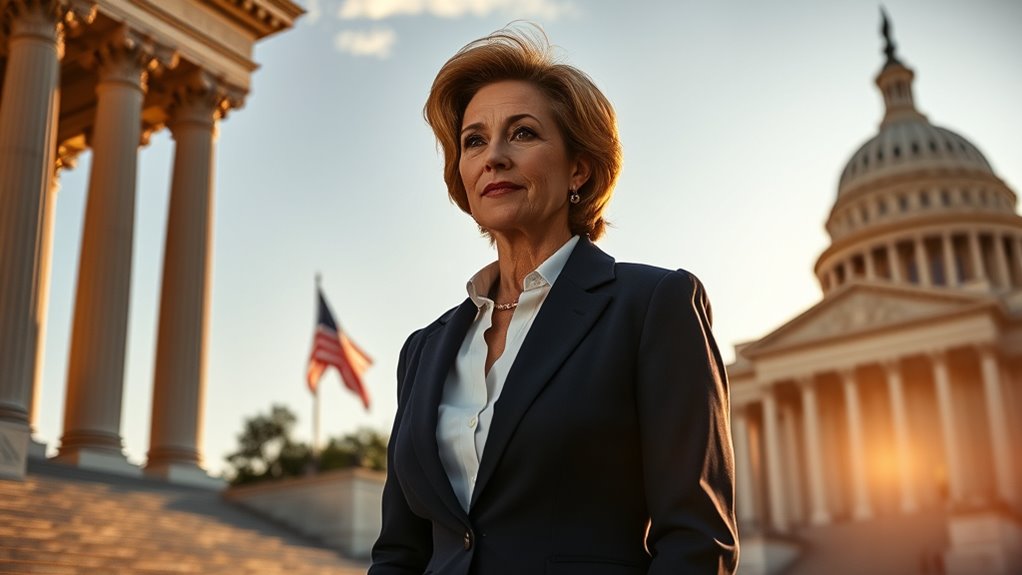
How did Greene manage to shift from business to politics so quickly? She announced her candidacy early in 2019, initially targeting Georgia’s 7th district before switching to the 6th. Her campaign focused on fiscal conservatism, criticizing federal spending and promising to balance the budget. When the 14th district opened up in late 2019, she moved her focus there, buying a home in Paulding County and reporting her relocation to Rome by early 2021. Greene campaigned on opposition to overspending and conservative principles, winning the Republican primary amid strong support from Trump-aligned voters. Her victory in November 2020, at age 46, marked her entry into Congress. From the start, she adopted a confrontational style, challenging election results and becoming known as a vocal, polarizing figure within the House. Additionally, her rapid rise was partly driven by her ability to connect with a segment of voters who favor conservative principles, propelling her to national prominence.
Committee Assignments and Political Shifts

You notice how Greene’s committee assignments have changed over time, reflecting shifting political alliances. Her removal from key panels shows how factional loyalty influences her role in Congress. These reassignments reveal the broader tensions within her party and her evolving influence. Her recent appointment to chair the new “Delivering on Government Efficiency” subcommittee signifies her increasing prominence in pushing her agenda, highlighting the importance of political strategy in shaping legislative roles.
Committee Removal and Reassignments
Why do committee assignments matter so much in Congress? They determine your influence, shaping policies and decision-making. When Greene was removed from the Budget and Education and Labor Committees in 2021, it sent a strong message about her controversial rhetoric. The House vote was 230-199, with only 11 Republicans supporting her removal, highlighting partisan divides. After Republicans regained control in 2023, Greene was reassigned to new committees focused on Homeland Security, Oversight, and Pandemic response, reflecting strategic shifts. These moves show how party priorities and ideological battles influence committee roles. Additionally, digital literacy in Congress plays a role in how legislators navigate evolving policy landscapes.
Factional Loyalty Shifts
Factional loyalty within Congress has become increasingly fluid, shaping committee assignments and political alignments. You see, Greene’s close support for Trump keeps her aligned with his core followers, even as she faces internal conflicts. Her expulsion from the House Freedom Caucus in 2023 reflects shifting alliances within the far-right, where personal disputes, like her insult toward Lauren Boebert, can cause real consequences. Since early 2023, Greene’s committee roles—on Homeland Security, Oversight, and the new DOGE subcommittee—highlight her rising influence among pro-Trump factions. These shifts demonstrate her movement from political exile to a leadership position, emphasizing her confrontational style and loyalty to Trump’s agenda. Her evolving factional ties impact her committee assignments, messaging, and intra-party relationships, reinforcing her role as a key, if controversial, player in GOP politics. Additionally, her strategic use of party loyalty helps solidify her position within the shifting landscape of congressional factions.
Support for Donald Trump and MAGA Policies
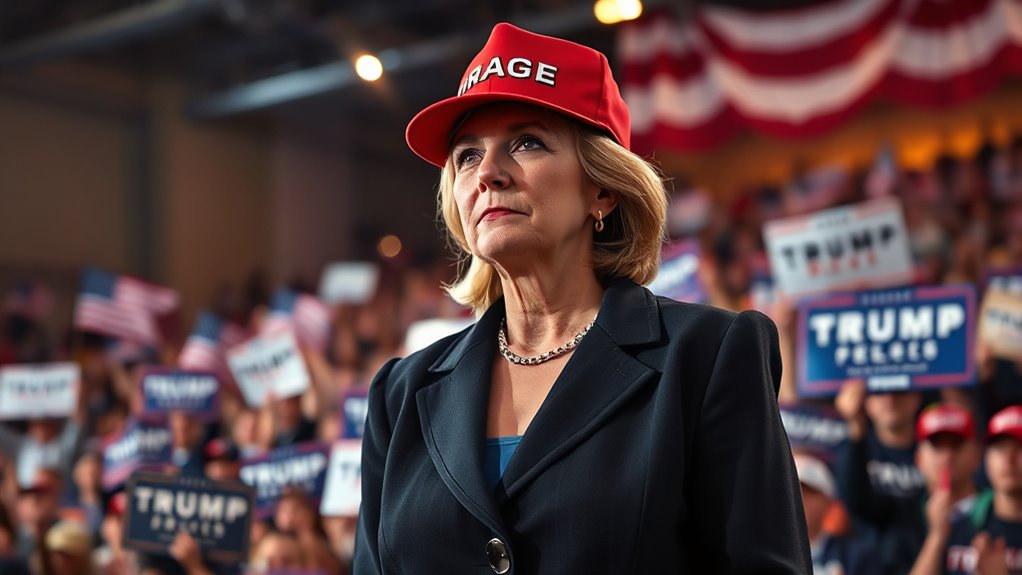
You can see how Greene openly supports Trump, calling him the leader America needs and praising his policies. She actively promotes MAGA priorities like border security and resisting federal overreach. Her loyalty to Trump fuels her aggressive political stance and energizes her base. Many of her statements reflect inspirational quotes that motivate her and her supporters to stand firm on their beliefs.
Trump Loyalty Demonstrations
Support for Donald Trump and his MAGA policies remains a defining feature of Congresswoman Marjorie Greene’s political stance, even as she occasionally diverges from Trump on specific issues. She publicly champions the core principles of the MAGA agenda, positioning herself as a defender against attempts to undermine it. Her voting record aligns closely with Trump-supporting Republicans, but she’s not afraid to oppose Trump when her principles conflict, such as on Ukraine funding, cryptocurrency legislation, and the Epstein case. Greene criticizes Trump’s recent messaging, warning that symbolic gestures no longer satisfy MAGA supporters demanding real results. She emphasizes holding Trump accountable to the base’s expectations, showcasing her loyalty through activism and vocal support while maintaining independence on certain policies. Her stance highlights the factional tensions within GOP loyalty to Trump. Despite her occasional disagreements, she continues to publicly express her support for Trump and his policies, underscoring her commitment to the broader MAGA movement. Additionally, her focus on political loyalty demonstrates her dedication to the principles that resonate with the core MAGA base.
MAGA Policy Advocacy
Congresswoman Marjorie Greene actively champions MAGA policies, aligning her public statements and legislative efforts with Donald Trump’s core priorities. She frequently voices support for strong border security, opposes federal overreach, and pushes cultural issues like banning gender-affirming care. However, she’s not afraid to criticize Trump’s policies, especially on military involvement in Iran and AI expansion, claiming these reflect base frustrations. Her messaging is fiery and divisive, framing opponents as “communist groomers” or “trans terrorists.” She sponsors bills like H.R.4403 to prohibit weather modification and H.R.4327 to benefit homeowners, emphasizing economic nationalism. Her rhetoric amplifies culture war themes, using social media to energize her base. Her advocacy blends populist rhetoric with selective alignment to Trump’s agenda, maintaining her position as a vocal MAGA supporter.
| Policy Focus | Key Actions/Statements | Cultural Messaging |
|---|---|---|
| Border Security | Advocates for restrictive immigration policies | Labels opponents as “woke” enemies |
| Federal Overreach | Critiques AI expansion, environmental policies | Uses hyperbolic language against “woke” |
| Culture War Issues | Proposes bans on gender-affirming care and weather modification | Frames debates as defending “innocence” |
Election Integrity and Election Skepticism
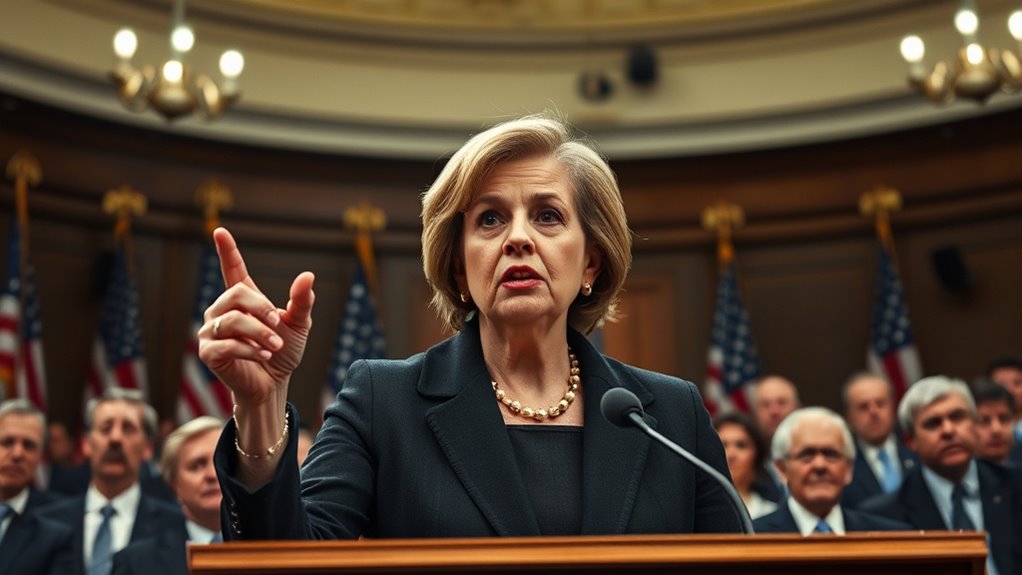
Why do claims of election fraud continue to influence American politics despite widespread denials from officials? Because figures like Greene persist in promoting false narratives that undermine trust in elections. Here’s what you should know:
- Greene repeatedly claims the 2020 election was stolen, despite evidence proving its legitimacy. Most election officials and courts have found no evidence of widespread fraud. This persistent denial undermines the public’s confidence in the electoral process.
- She confronted Georgia election official Gabriel Sterling, accusing him of minimizing voter fraud, which officials deny.
- She supports the MAGA wing and the Election Integrity Caucus, spreading baseless allegations and pushing for stricter voting laws.
- Her rhetoric fuels voter distrust, lowers confidence in democratic processes, and deepens political polarization.
This ongoing skepticism challenges bipartisan efforts to preserve election integrity and threatens the foundation of democratic norms.
Controversial Public Statements and Rhetoric
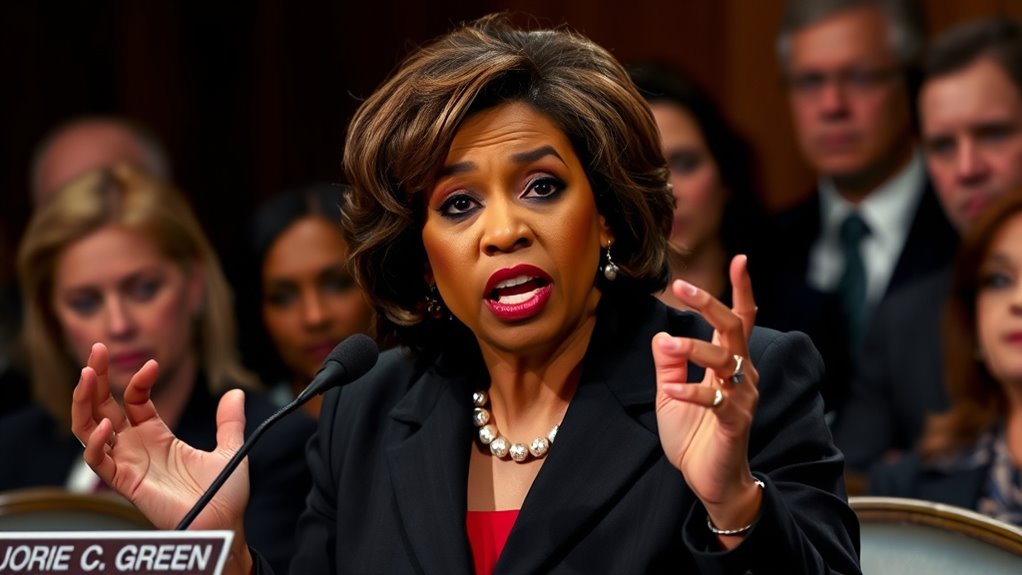
Greene’s controversial public statements and rhetoric have markedly shaped her political image, often sparking widespread outrage and debate. You see, she promotes conspiracy theories, claiming 9/11, mass shootings, and “Jewish space lasers” are true, despite no evidence. She denies the legitimacy of the 2020 election, endorsing false claims about voting machine tampering and fraud. Her language is often racist, Islamophobic, and anti-LGBTQ, fueling division and backlash. She compared COVID-19 mandates to the Holocaust, trivializing atrocities and inciting distrust. Greene has also called for violence against Democrats and used inflammatory rhetoric to target opponents. She dismisses government institutions as corrupt, positioning herself as an outsider. Her provocative statements attract both support and fierce criticism, deepening societal and political tensions. Her support for baseless claims and extreme rhetoric has led to her being labeled as a “right-wing extremist” and a figure of controversy on both sides of the political spectrum.
Social Media Strategies and Online Presence

You notice how Greene uses provocative posts and emotional language to boost engagement on her social media accounts. She often employs controversial content and memes to stir reactions and expand her online reach. By amplifying disputes and controversy, she effectively mobilizes supporters and garners media attention. Additionally, understanding the role of social media strategies in shaping public perception is crucial for analyzing her online presence.
Social Media Engagement Tactics
To effectively shape her online presence, Marjorie Taylor Greene employs a variety of social media engagement tactics that maximize her reach and influence. She posts frequent updates to stay connected with her followers, using eye-catching visuals like images and videos. She leverages hashtags and tags relevant figures to boost visibility. Responding to comments and messages fosters a sense of community, while sharing personal stories makes her more relatable. Collaborations with influencers or other politicians expand her reach even further. Additionally, she uses interactive content like polls and questions to encourage participation. By maintaining consistency across platforms and strategically managing her online reputation, she reinforces her personal brand and political image. She also emphasizes social media strategies that capitalize on current digital trends to increase engagement. These tactics keep her audience engaged and help amplify her message effectively. Her social media activity is a key component of her public image strategy.
Online Controversy Amplification
Marjorie Taylor Greene’s online presence is heavily shaped by how her controversies spread and intensify across social media platforms. You see, platforms like X (formerly Twitter) and news outlets quickly amplify her statements, making them viral. Public reactions from officials and critics often fuel debates further, drawing more attention to her remarks. Greene’s support for conspiracy theories, such as QAnon, stokes online discussions and polarizes audiences. She actively posts content that sparks controversy, leading to heated debates and misinformation spread. Media coverage intensifies her visibility, often highlighting her inflammatory remarks. Despite criticism, her online presence sustains her influence within the Republican Party. Online support and backlash coexist, ensuring her controversies remain prominent, perpetuating political polarization and making her a persistent digital figure. Her statements frequently draw bipartisan criticism and media scrutiny for promoting misinformation and inflammatory rhetoric.
Engagement With Conspiracy Theories

Greene’s engagement with conspiracy theories has been a defining aspect of her public persona, as she actively promotes and spreads various false claims. You see, she’s promoted QAnon theories, claiming a child trafficking ring run by Democrats, and contributed to extremist websites like American Truth Seekers. She’s used social media to spread these ideas, becoming the first open supporter of QAnon in Congress. Research questions and overall study design reveal that such conspiracy beliefs are resilient and often unaffected by criticism. She believed the 2017 Las Vegas shooting was a false flag, not a lone gunman. She questioned whether a plane hit the Pentagon on 9/11, suggesting it might have been a missile. She speculated that the 2018 California wildfires were caused by Jewish elites using space lasers. She claimed Justice Ginsburg was replaced by a body double, fueling more conspiracy theories.
Legislative Priorities and Policy Focus
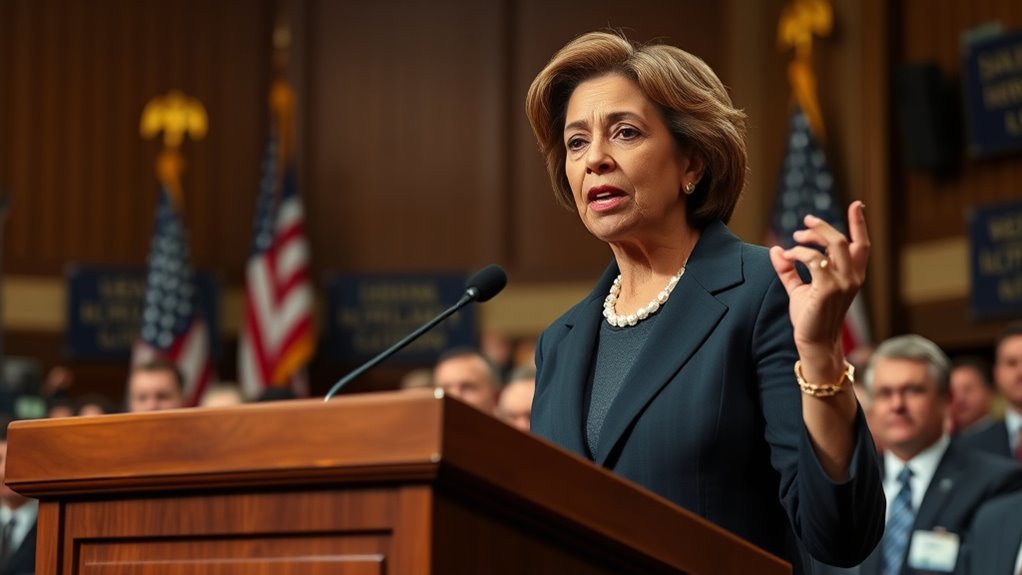
Her legislative priorities reflect a strong commitment to conservative values and a focus on safeguarding American interests. You see her championing federalism, emphasizing states’ rights and local control over federal authority. She prioritizes America First policies, ensuring that U.S. interests come before global concerns. Her support for economic growth is evident through backing legislation that boosts business opportunities and reduces tax burdens. Social conservatism guides her, advocating for policies that uphold traditional values and protect children from premature exposure to adult themes. She pushes for government accountability, demanding transparency and reforms in federal agencies. Recent actions include sponsoring bills to eliminate restrictions on gain exclusions, prohibiting weather modification, and clarifying citizenship laws. Overall, her legislative focus is rooted in conservative principles, emphasizing national sovereignty, economic strength, and social values.
Public Perception and Political Impact
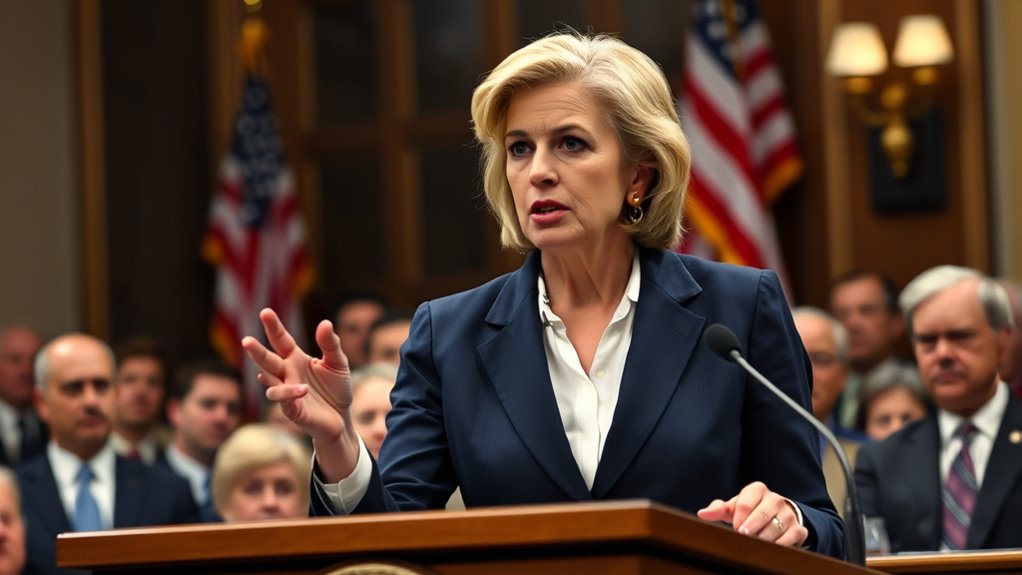
Despite her strong presence in media and politics, public opinion of Greene remains deeply divided. You’ll see that only 6% of U.S. adults view her very favorably, and she ranks as the 25th most popular Republican. Here’s what else shapes her perception:
- About 24% see her positively, but 36% of those aware of her dislike her, reflecting significant opposition.
- In her district, more Trump supporters crossed over to her Democratic opponent than any other Georgia Republican.
- She won her race with 63%, though Trump’s broader support is stronger, with 68% backing him.
- Greene’s outspoken media presence and controversies keep her polarizing, maintaining a loyal base while attracting widespread criticism.
Frequently Asked Questions
What Are Marjorie Taylor Greene’s Most Controversial Statements?
Your current question asks about the most controversial statements made by a public figure. You might find that she promoted conspiracy theories, like claiming 9/11 was an inside job and COVID-19 origins were false. She also made racist, Islamophobic, and anti-LGBTQ remarks, and supported violence against political opponents. Her false claims about the 2020 election and baseless allegations have fueled distrust and heightened political tensions markedly.
How Has Greene’s Political Influence Changed Over Time?
Imagine observing a rising star whose influence fluctuates with each controversy; that’s how Greene’s political reach has evolved. Initially marginalized for promoting conspiracy theories, she now maintains a solid base through reelections and committee roles. Her vocal advocacy for MAGA principles and bold statements keep her in the spotlight, though her impact varies with shifting party dynamics. Over time, she’s solidified her position as a key voice on the far right.
What Legal Issues or Investigations Has She Faced?
You should know that Greene faces several legal issues and investigations. She’s involved in a challenge claiming disqualification under the Fourteenth Amendment due to her alleged role in the January 6 insurrection. Additionally, she’s been scrutinized for stock trades, including Tesla, with accusations of insider trading and conflicts of interest. These investigations include ethics reviews and potential legal consequences, drawing significant public and media attention.
How Do Her Constituents View Her Performance?
You might feel torn between admiration and frustration when considering her performance. While she wins her district convincingly, many constituents are less enthusiastic, especially compared to Trump’s broader support. Some see her as a strong voice for conservative values, yet others feel she’s too divisive. Despite her legislative efforts, her controversial stance often sparks debates, reflecting a complex mix of loyalty and disappointment among her constituents.
What Are Her Future Political Ambitions?
You’re curious about her future political ambitions. She’s considering running for statewide office in Georgia, possibly for governor, given the open seat and her strong state ties. Although she won’t seek the Senate, she remains confident in her electability and keeps her options open for other positions. Her close ties to Trump and her MAGA alignment suggest she aims to influence Georgia politics and possibly broader Republican strategies beyond 2026.
Conclusion
You see her as a lightning bolt, striking through the calm of politics, shaking foundations with each spark. Her voice, a flame that ignites passions and fears alike, fuels the wildfire of controversy. As you watch her navigate the storm, remember she’s both the storm and the eye—chaos and clarity intertwined. In her wake, the landscape shifts—an uncharted terrain where loyalty and skepticism collide—leaving you to wonder what lies beyond the horizon she’s shaping.










